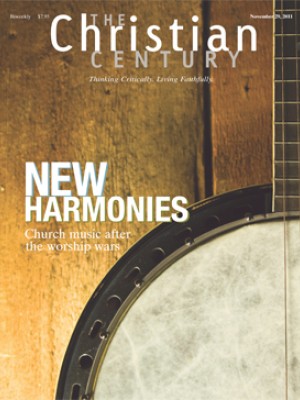From Disgust to Humanity, by Martha C. Nussbaum
Amid a flailing economy at home and continuing U.S. military engagement abroad, issues of sexuality retain a prominent place on the American political agenda. Do Americans simply have a prurient obsession with what others do in the privacy of their bedrooms, or do the continuing debates about sexual orientation reflect deeper divisions in our culture? What is the root reason that gay, lesbian, bisexual and transgender people are so widely perceived as deviant? How should the Christian community respond to the many contentious issues that arise from differences in sexual orientation?
Same-sex marriage is now fully legal in six states plus the District of Columbia. The U.S. military's controversial "don't ask, don't tell" policy has been repealed. LGBT clergy increasingly are welcomed as leaders of mainline Protestant and Jewish congregations. Poll after poll indicates growing tolerance of LGBT people among the American public—particularly among younger people. Some perceive the coming of LGBT equality as inevitable and rejoice, while others lament the passing of yet another element of traditional American morality. Cultural change is always welcomed by some and profoundly resisted by others.
Read our latest issue or browse back issues.
In From Disgust to Humanity, legal scholar Martha Nussbaum of the University of Chicago moves through the rhetoric surrounding homosexuality and asserts that aversion to LGBT people, and thus opposition to their social equality, is rooted in the "politics of disgust": dominant groups' tendency to label particular beliefs, practices and innate characteristics as not just anathema but physically disgusting, which legitimizes systematic mistreatment of people who embody the undesirable beliefs, practices or characteristics.
Nussbaum contends that the politics of disgust must be replaced at every turn with an inclusive "politics of humanity": the accordance of equal respect, rights and opportunities to all. People of faith have much to learn from Nussbaum's perspective because it cuts to the heart of the sinful human tendency to exclude and stigmatize our fellows when they fail to live up to culturally imposed expectations about how "good people" should conduct themselves in this world.
Throughout her book, Nussbaum uses evocative terms to illustrate the nature of the disgust that she says underlies discrimination against LGBT people. She refers frequently to things that typically evoke unthinking revulsion, such as bodily wastes, decaying food and slimy insects, saying that LGBT people evoke a similar reaction in their opponents.
When homosexuality is framed as disgusting, heterosexual people and their intimate practices come to be seen not just as acceptable but as clean and pure by comparison. Thus antigay rhetoric results in LGBT people being represented as "the surrogate dirt of a community, enabling the dominant group to feel clean and heavenly," much as Indian "untouchables" (dalits) are irredeemable in traditional Hinduism, as Jews were demonized in Nazi Germany and as African people were considered worthy of enslavement in North America.
The practice of elevating some members of society while condemning others—in accordance with often arbitrary, ever-changing and culturally bound rubrics—is an unfortunate reality of the human condition. Just as a bully gets a jolt of self-esteem from disdaining others, dominant members of society feel better about themselves when they disdain others. "Projective disgust is inspired by a powerful loathing of aspects of the self, and it typically seeks a handy scapegoat," Nussbaum writes.
The practice of scapegoating has an unusual relationship with the central tenet of American culture: individualism. Because of the centrality of individual freedom in American culture, many Americans assume that other people's values, attitudes and behaviors are primarily the result of voluntary choice: if you're different from me, it is because you have chosen to be that way, and if something about you runs afoul of the dominant values system, you have chosen to be deviant. Thus the individualism that pervades American culture makes it easier to react with disgust to people who live outside of the mainstream in one way or another. Moreover, many Americans assume that people are free to overcome their "deficiencies"—and to do so on their own, without support from the community. Overweight? Follow the latest wonder diet. Lifelong smoker? There's no excuse for not giving up that filthy habit!
If we transpose Nussbaum's logic from the legal realm to the context of the church, we must conclude that all people must be welcomed fully, without caveat. Nussbaum would have no tolerance for a "theology of disgust," including the "love the sinner, hate the sin" trope. Fortunately, she notes, in most matters American religion is inclined to reject the politics of disgust: "In the area of religion, America . . . has consistently sided against collectivist values and in favor of a strong respect for the individual's zone of liberty."






